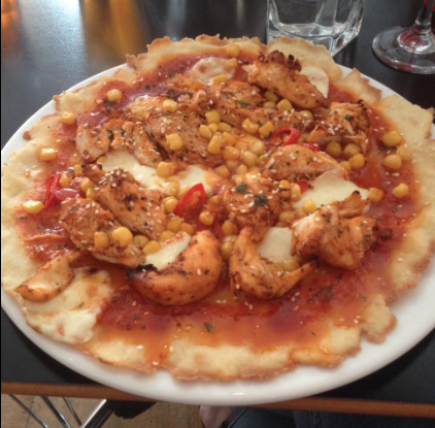Trying to eat out whilst suffering with coeliac disease can be a tedious challenge – but Manchester restaurants and cafes are making the search for gluten-free food easier to stomach.
MM are here to reveal the best gluten-free food places in the city as well as the facts behind the disease.
Recently, it was reported that coeliac disease can affect one-in-100 people in the UK and new statistics from Coeliac UK show that only 24% of people with the condition have been diagnosed.
The statistics come from new research conducted by the University of Nottingham, who found a fourfold increase in the rate of diagnosed cases in the UK over the past 20 years.
Yet alarmingly, three quarters of people still remain undiagnosed.
Most people think coeliac disease is an allergy or intolerance to gluten, which is a protein found in wheat, barley and rye – but this is not the case.
Coeliac disease is a digestive condition that is triggered by gluten, otherwise known as autoimmune disease.
Autoimmune disease occurs when the immune system mistakes substances found inside gluten as a threat to the body, which consequently leads to the attack of healthy tissue in the small bowel (intestine) and disrupts the body from absorbing any nutrients from food.
Chief Executive of Coeliac UK Sarah Sleet said: “This latest research shows that nearly a quarter of people with coeliac disease have now been diagnosed and gives an up-to-date picture of the diagnoses levels across the UK.
“Of course, increasing numbers with a diagnosis is good news and will inevitably mean that there will be an increased demand for gluten-free products in supermarkets.
“But three quarters undiagnosed is around 500,000 people – a shocking statistic that needs urgent action.”
However, often it can be quite hard to distinguish the symptoms.
Amy Munro, 32, a mother-of-three and a freelance graphic designer who lives in Cheshire, confused her coeliac disease symptoms for other things before getting diagnosed in 2012.
Amy said: “Looking back, I had symptoms for a long time which I put down to IBS (irritable bowel syndrome) and bloating.
“I had low iron levels and B12 (vitamin deficiency) which weren’t going up despite taking supplements for a long time, this is the reason for the doctors testing for it.”
The varied nature of the symptoms of the disease can also make it tough to identify.
Ranging from mild to sever, symptoms include bloating, diarrhoea, nausea, wind, constipation, tiredness, anaemia, mouth ulcers, headaches, sudden or unexpected weight loss, hair loss and skin rashes.
If the disease is left untreated, it could lead to infertility, osteoporosis and even small bowel cancer.
A simple blood test can be taken to check for antibodies and GPs can guide advise treatment.
Faye Douglas, 21, a student and writer/editor of blog Sugar Spun Sisters, was diagnosed four years ago after visiting the doctors plenty of times.
Faye said: “I’d been to the doctors numerous times with, what I now know as, symptoms of being coeliac before I was given a blood test in which they checked for the disease.”
Faye’s blog focuses on clothes, cosmetics and coeliac disease, and is co-hosted by her sister Eve, guiding readers on how to cope with coeliac disease and sharing gluten-free recipes.
Once diagnosis has been confirmed, the tricky part occurs – trying to find gluten-free foods in supermarkets, shops, cafes and restaurants that are affordable – as something as simple as a lunch break can lead to a stressful situation.
Even if restaurants and cafes have gluten-free options, the risk of cross-contamination is ever-present, such as getting rogue breadcrumbs near an item of gluten-free food could lead to excruciating symptoms for a coeliac sufferer.
Amy said: “Most local cafes do have a gluten-free option like jacket potatoes, however, sometimes when I mention the risk of cross-contamination to staff members they look a bit bamboozled!
“I once saw a member of staff at a café cut up a toastie then use the same knife to cut a jacket potato after – it didn’t fill me with confidence to eat there again.”
However, some restaurants and cafes are very supportive about coeliac disease and offer a wide range of tasty gluten-free alternatives for coeliac sufferers.
Kate Pires, 23, a digital marketing executive who lives in Manchester, tested negative for coeliac disease – but removes gluten from her diet as she has a clear intolerance to it.
“The main annoyance for me is not being able to eat many on-the-go foods so you really have to plan your foods daily and bring it with you if out,” she said.
Kate has managed to find some hidden gluten-free gems in Manchester and was eager to share some of them with MM.
“There’s a store called 8th day on Oxford Road, near MMU, that sells food catered to many allergies, intolerances or dietary restrictions,” she said.
“I can find many products there that I can actually eat, which is exciting!”
Both Kate and Faye stressed how important it is to research a restaurant or café before going out and both girls often ring ahead to check if they aware of cross-contamination in the kitchen and if they have any gluten-free items on the menu.
To help Mancunian coeliac suffers or people on a gluten-free diet, MM decided to test out and research some of the gluten-free cafes and restaurants in Manchester.
First up was Dough on High Street, a delectable pizzeria where unique flavour combinations are mixed.
The Italian eatery caters really well for coeliac disease and make clear on their menu that any pizza can be made gluten-free.
Not only this, they can also make pizzas dairy-free too.

A SLICE OF HEAVEN: Dough’s tasty gluten-free pizza’s are a gem
The pizza tasted just as delicious as a gluten-based pizza and it still had the crisp yet doughy texture that a pizza ought to have – this place is a must.
We then visited Home Sweet Home on Edge Street, a quaint café that supplies the most adventurous and colourful cakes.
The café offers all sandwiches on gluten-free bread that makes lunch breaks bearable as you can grab a quick, and safe, sandwich.
Finally on the gluten-free foodie trip was Sugar Junction on Tib Street, notable for its decadent cakes in a vintage post-war atmosphere.
The day/night café offers gluten-free cakes, desserts and sandwiches, and even a gluten-free afternoon tea, which are among the tasty treats to enjoy.
To name a few, fellow gluten-free friendly foodies also include: Gaucho, Tea42 and Bakerie.
Although many will think it is solely independent cafes and restaurants which are catering to non-gluten meals, a lot of chain restaurants are making coeliac cuisine accessible too.
Amy went to eat at Italian chain Piccolino in Manchester and found they were very accommodating to gluten-free food.
“They seemed very aware, which is quite ironic seeming as they’re an Italian restaurant with pizzas, pastas and gluten galore,” said Amy.
Although being coeliac can seem daunting, more and more supermarkets, cafes and restaurants are catering to gluten-free products – which help to make tasty food still accessible to all.
The national charity Coeliac UK have provided assistance to many who live with the disease on a daily basis and provide useful information for when it comes time to do ‘the big shop’.
Amy told MM: “When I was first diagnosed I joined Coeliac UK, which send a free booklet providing a comprehensive list of gluten-free products that you can buy in each main supermarket – it was my saviour in the first year of diagnosis.”
If you want to find out more information about coeliac disease or how to cope with the disease, visit their website.
Image courtesy of Coeliac UK via Youtube with thanks



